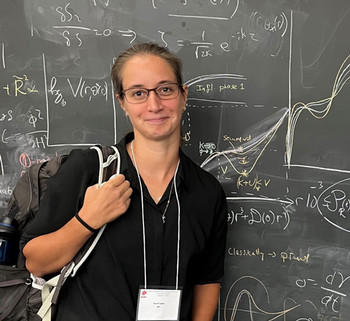Sarah Geller Colloquium
Fri. Nov. 22 12:30 PM
- Fri. Nov. 22 01:20 PM
Contact: Andrea Wiebe
Location: 3M69
 Sarah Geller, NSF MPS Postdoctoral Research Fellow
Sarah Geller, NSF MPS Postdoctoral Research Fellow
Santa Cruz Institute for Particle Physics
Primordial Black Holes as Dark Matter: from Formation to Detection
Primordial Black Holes are hypothetical black holes which form from direct gravitational collapse rather than the collapse of a dying star. They can form with nearly any mass and are a compelling candidate to explain the missing “dark” matter in the universe: matter we can feel gravitationally but cannot see. In this talk, I will discuss the various ways that primordial black holes could have formed, the constraints on their abundances at various masses, and the observational clues that there are primordial black holes in our universe. Lastly, I will talk about some of the ideas for detecting primordial black holes that fly through the solar system and what we can learn from these cosmic visitors!
Bio: Hi, I’m Sarah, and I’m a theoretical physicist specializing in cosmology, and occasionally particle physics and gravity. I am currently an NSF MPS Ascend postdoc fellow based primarily at the Santa Cruz Institute for Particle Physics. I did my PhD at MIT, advised by Alan Guth and David Kaiser. My interests in cosmology are broad, including gravitational wave physics, inflationary cosmology, cosmic neutrinos, and more, but of lot of my recent work has focused on the possibility of primordial black holes with masses comparable to those of asteroids. I’m really fascinated by how these could have formed in the early universe, and most of all, how they could be detected with current precision technology and simulations. When not doing physics I can be found hiking with my dog Wally, swimming across lakes (the short way), and playing classical guitar. http://www.sgellerphysics.com
For a Zoom invitation to this talk, please email: an.wiebe@uwinnipeg.ca
A joint-event hosted by the UofW and WITP (Winnipeg Institute for Theoretical Physics)

